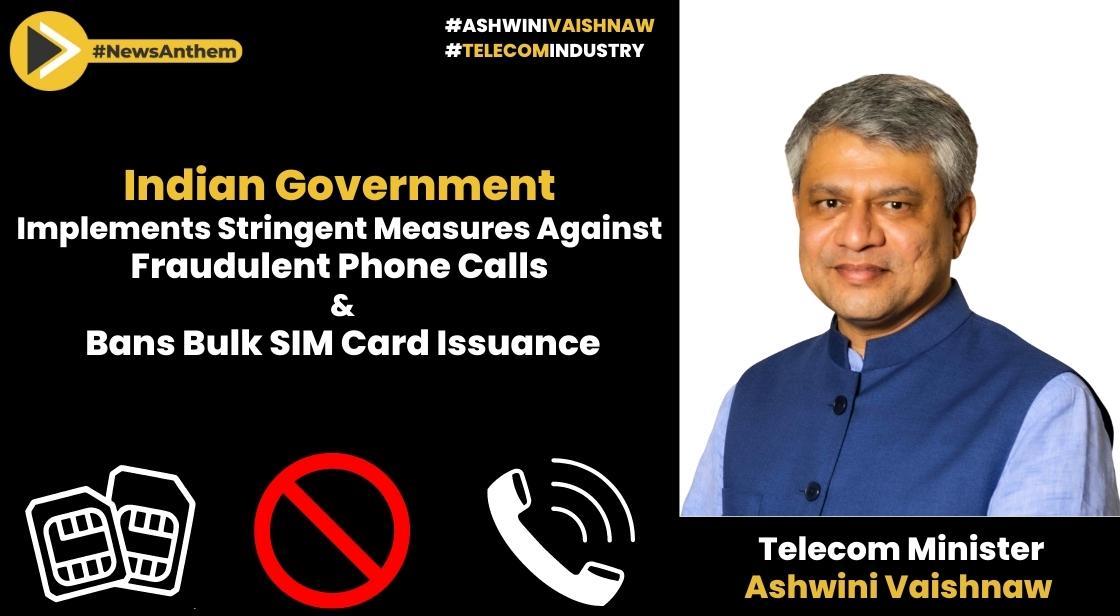Government Implements Stringent Measures Against Fraudulent Phone Calls, Bans Bulk SIM Card Issuance

News Synopsis
As part of its commitment to curbing fraudulent phone calls and telecom fraud, the government has taken a resolute stance by banning bulk SIM card connections and mandating rigorous verification procedures for SIM card dealers.
These measures are designed to thwart fraudsters and ensure greater accountability in the distribution of SIM cards.
Halt on Bulk SIM Card Connections:
To address the challenge of automated calls facilitated by SIM boxes, the government has made a significant decision to discontinue the issuance of bulk SIM card connections. Telecom Minister Ashwini Vaishnaw emphasized the need to replace the existing system with a more robust framework for proper business connections.
Individual KYCs for Business Connections:
Under the new regulations, businesses seeking multiple SIM cards will be required to undergo individual Know Your Customer (KYC) procedures. For instance, if a company requests 4,000 SIM cards, each employee receiving a SIM card must undergo KYC verification.
This approach ensures a higher level of accountability and safeguards against fraudulent activities.
Enhanced Verification for SIM Dealers:
Vaishnaw pointed out that SIM dealers often circumvent verification processes, allowing for fraudulent SIM card sales. To counter this, the government will mandate indisputable verification for point of sale dealers, aiming to hold those who distribute SIM cards fraudulently accountable.
Impactful Reforms for Curbing Fraud:
While these measures might appear incremental, Vaishnaw emphasized their potential for generating a substantial positive impact. Informed by discussions with law enforcement agencies and the telecom industry, these reforms are poised to reshape the landscape of telecom fraud prevention.
Government's Proactive Actions Against Fraud:
The government's efforts extend beyond SIM card regulations. Notably, the government has undertaken a multipronged approach to combat telecom fraud. This includes blocking 66,000 fraudulent WhatsApp accounts, blacklisting 67,000 SIM card dealers, registering 300 First Information Reports (FIRs) against fraudsters, deactivating 8 lakh payment wallet accounts linked to fraudulent transactions, invalidating 52 lakh phone connections obtained through fraudulent means, and blocking 17,000 lost or stolen mobile handsets.
Sanchar Sarthi Portal:
A Pillar of Anti-Fraud Initiatives: These impactful actions stem from the launch of the Sanchar Sarthi portal in May of the current year. This platform serves as a critical tool in the government's efforts to tackle telecom fraud cases effectively and comprehensively.
Some relevant and latest facts about the government's crackdown on fraudulent phone calls:
-
The government has prohibited the issuance of bulk SIM card connections, which is a major source of SIM cards for fraudsters.
-
The government has also made it mandatory for SIM card dealers to undergo verification, which will make it more difficult for fraudsters to obtain SIM cards from dealers.
-
The government has also blocked 66,000 fraudulent WhatsApp accounts, blacklisted 67,000 SIM card dealers, registered 300 FIRs against fraudsters, blocked 8 lakh payment wallet accounts for fraudulent transactions, deactivated 52 lakh phone connections obtained by fraudulent means, and blocked 17,000 mobile handsets that were either lost or stolen.
-
These measures are a part of the government's efforts to combat telecom fraud cases.
-
The government has launched the Sanchar Sarthi portal to help people report telecom fraud cases.
-
The portal has received over 1 lakh complaints since it was launched in May 2023.
The government's crackdown on fraudulent phone calls is a welcome move. These calls are a major nuisance and can also be very costly for victims. The measures announced by the government are a step in the right direction and should help to reduce the number of fraudulent calls.
In addition to the measures announced by the government, there are a number of things that individuals can do to protect themselves from fraudulent phone calls. These include:
-
Never give out personal information, such as your bank account number or credit card number, over the phone.
-
Be suspicious of any unsolicited calls, especially those from numbers you don't recognize.
-
Hang up immediately if you are asked to provide personal information or make a payment.
-
Report any suspicious calls to the police.
Conclusion:
As fraudulent phone calls continue to pose challenges, the government's stringent measures against bulk SIM card connections and enhanced verification procedures for SIM dealers mark a significant step toward curbing telecom fraud.
By promoting accountability, these reforms stand to protect consumers and reinforce the integrity of communication networks.
The government's commitment to thwarting fraudulent activities sends a clear message that the evolving landscape of technology-based crime will be met with equally adaptive and robust countermeasures.
You May Like









